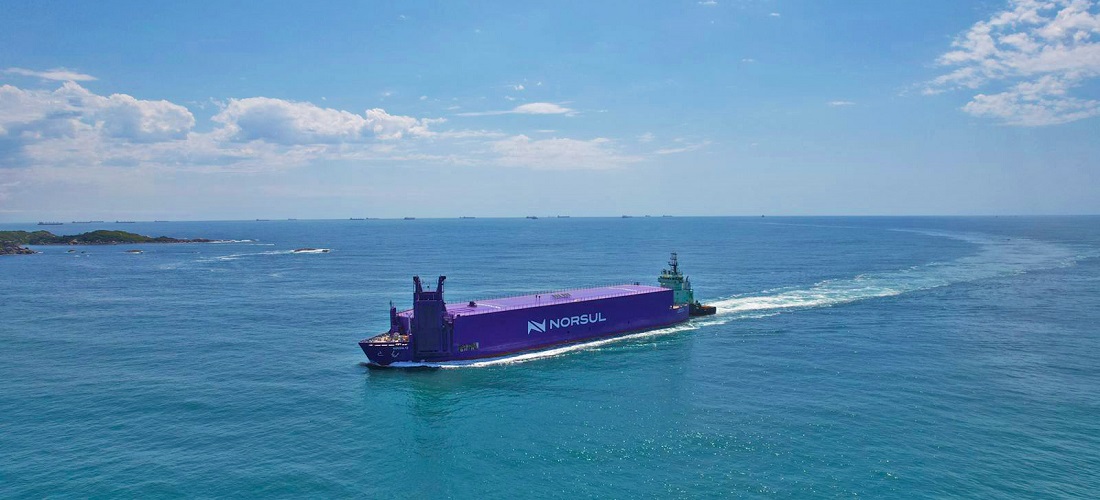
Norcoast starts cabotage routes in Q1 2024
Oct, 23, 2023 Posted by Gabriel MalheirosWeek 202342
Norcoast, a newly formed cabotage company by Hapag-Lloyd and Norsul, is set to kick off operations in the first quarter of 2024, CEO Gustavo Paschoa said.
Specializing in container handling, the company will launch with four vessels, each with a capacity of 3,500 TEUs (20-foot equivalent units of containers). These vessels will service the coastal route from Paranaguá in Paraná to Manaus, in the state of Amazonas, stopping at key ports like Santos in São Paulo, Suape in Pernambuco, and Pecém in Ceará.
Mr. Paschoa remarks, “The Brazilian cabotage sector hasn’t welcomed a new player in two decades, revealing a significant latent demand in the country.” He emphasizes the synergy of the joint venture, noting, “It combines Norsul’s expertise in cabotage with Hapag-Lloyd’s prowess in container management.”
In 2022, the two companies finalized their agreement. This year, they secured all the necessary permits. Crucially, Norcoast received the green light from ANTAQ (National Waterway Transportation Agency) on the 18th, marking their final necessary approval.
In 2020, Norsul, a Brazilian company known for its cabotage operations with bulk cargoes, initiated a diversification strategy. This move was inspired by discussions surrounding the proposed “BR do Mar” legislation aimed at modernizing the maritime sector. By the close of 2021, Norsul entered into talks with Hapag Lloyd, a renowned global shipping company with a presence in 135 countries.
The maritime industry is witnessing a trend where long-haul ships are becoming larger, underscoring the growing significance of cabotage for these vessel owners. As one industry insider notes, “The cabotage sector harbors immense growth opportunities.”
Currently, the domestic cabotage landscape in Brazil is led by three major groups, all tied to long-haul shipping giants: Aliança (a subsidiary of Maersk), Login (under MSC), and Mercosul Line (part of CMA CGM). While Hapag-Lloyd has a stake in Norcoast, the latter is committed to serving a broader clientele, with a keen emphasis on domestic needs, as highlighted by Mr. Paschoa. He anticipates cargo from long-haul routes will constitute roughly 20% to 30% of Norcoast’s overall volume.
Mr. Paschoa also accentuates how the newly implemented “BR do Mar” law has been advantageous for the nascent company. Such legislation was crafted to rejuvenate Brazil’s cabotage market. A pivotal facilitation for Norcoast was the provision allowing the inclusion of four ships. Preceding this law, a company would have needed an established Brazilian fleet to import “bareboat” vessels —ships provided without crew and operated by the receiving company. Mr. Paschoa assures, “An entirely Brazilian crew will man the vessels.”
Beyond its cabotage services, Norcoast plans to provide comprehensive multimodal solutions. “We’re extending our operations 400 km inland from the coast. We’ve established operational agreements with port terminals at every port we service. Additionally, we’re setting up container storage facilities and warehouses for the consolidation and deconsolidation of cargo. Our network also encompasses 70 road transportation partners,” explained the executive.
Over the next three years, Norcoast anticipates a steady growth in the volumes they manage. It aims to handle nearly 200,000 TEUs annually, factoring in operations across the five ports and various transport modes.
Mr. Paschoa believes a significant portion of Norcoast’s growth will be fueled by meeting the unserved demand in the market. Currently, many potential customers don’t utilize cabotage due to its limited capacity. The company’s goal is to attract a diverse clientele.
Mr. Paschoa elaborates, “We aim to broaden the sectors that utilize cabotage, potentially bringing in retail businesses or smaller enterprises. While trucks are often seen as a more straightforward option, cabotage does require foresight since ships have weekly departures. With the aid of digital platforms and dedicated support teams, we’re confident that even smaller firms can adopt this mode.” Norcoast plans to offer solutions for customers who don’t have enough cargo for a full container by consolidating shipments from various clients.
In response to the current severe drought in Amazonas, which is restricting ship movements, Mr. Paschoa expressed concern. While Norcoast is not operational yet, they’re proactively strategizing for such challenges in the future.
“Leveraging Norsul’s expertise in ferry operations gives Norcoast an edge in planning for the upcoming year. We did attempt to utilize the Vila do Conde terminal as an alternative but its limited capacity made it less effective,” he explained.
Mr. Paschoa also emphasizes the need for public sector involvement to solve these challenges. “Addressing this recurring issue requires measures like regular dredging of the canal and exploring transshipment alternatives. This will help reduce, if not eliminate, the impact of the annual droughts, which are unprecedentedly severe this year, highlighting the urgency for better planning. However, it’s essential to recognize that these droughts will likely persist and could become even more acute in the future.”
-
Meat
Jul, 29, 2024
0
Beef exports expected to hit record high in 2024, says Brazil’s Conab
-
Economy
Oct, 17, 2022
0
Brazil: costs and logistics stand as major problems for exporters
-
Ports and Terminals
Dec, 16, 2020
0
MINFRA receives R$3.6 billion investment proposal for new port in Natal
-
Shipping
Jun, 21, 2019
0
Maersk offers customers carbon-neutral transportation

